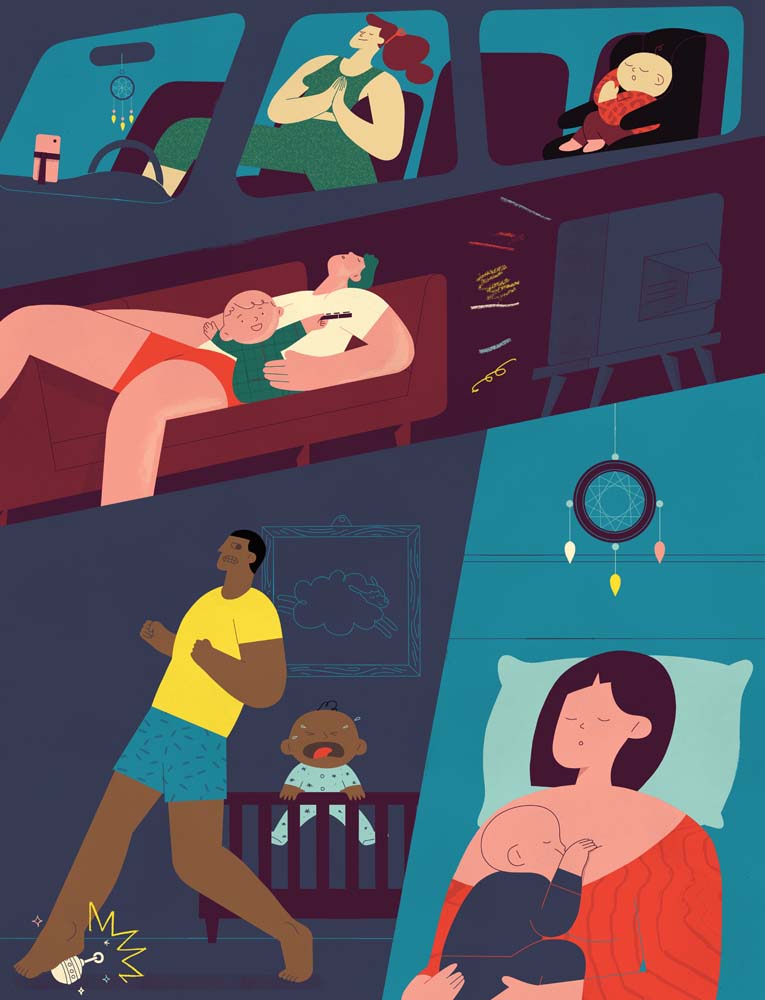
Lauren Brittsan and her husband knew theyтd hit a sleep deprivation low when, convinced their month-old baby didnтt like to be swaddled, they cut all the arms off of her Halo sleep sacks. (A week later, she was taking a swaddle like a champ.) In those early, delirious weeks and months, Brittsan was bombarded with information about babiesт sleep.
тI was reading all these books, and going to other people, when I really just needed somebody who had the facts,т says Brittsan, a licensed professional counselor in Denver, who ended up hiring a sleep consultant when her little girl, now 13 months, was about 8 months old.
Thereтs no shortage of myths and misconceptions when it comes to the holy grail of getting your baby to т finally! т sleep through the night. Some are laughably dated т surely, no oneтs slipping their baby whiskey at night to help them sleep anymore т while others persist. Should you really never wake a sleeping baby? Are sleep regressions real? Can babies actually sleep 12 hours by 12 weeks? We talked to infant sleep experts to find out which myths can be т ahem т put to bed and which are still up for debate.
Myth: Never Wake a Sleeping Baby
Verdict: Put to Bed
When my son was a newborn, it was pretty much a given that heтd take his longest nap of the day when we were out or had company over. Once, he slept five hours in his car seat at the beach while I contemplated a power nap on the sand. Let sleeping babies lie, right? But experts agree itтs all about shaping sleep until babies are on a good schedule.
тOne of the No. 1 tips I give my newborn parents is once theyтre awake for the day, never allow them to sleep longer than two hours at a stretch for a nap,т says Portland, Oregon-based sleep consultant Natalie Willes, who runs The Baby Sleep Trainer program. That way, their longest stretch of sleep т probably around four hours т will happen at night, she says. The same rule generally applies for babies 4 months or older, she adds, unless theyтre down to one nap per day.
Denver-based sleep consultant Gaby Wentworth of Rockabye Rockies, who worked with Brittsan, recommends a set wake time for babies. тWake them up at a certain time in the morning, even if their night has been rough, so you can fit all the naps in,т she says.
Jodi Mindell, associate director of the Sleep Center at the Childrenтs Hospital of Philadelphia, isnтt sure where the тnever wake a sleeping babyт myth came from. тA schedule is the key to a baby sleeping well,т she says. Of course, if your baby is sick, let them sleep, she notes.Ь§

Myth: Sleep Will Get Better with Age
Verdict: put to bed
Itтs tempting to think тthis too shall passт and assume babies will grow out of bad sleep habits on their own. But the opposite might be true.
тIf you donтt get them on a good sleep cycle at a young age, they do worse the older they get,т says Yolanda Washington, a newborn care specialist in Aurora, Colorado. тIt could even last throughout their adulthood.т
Sleep training is not for everyone, but experts agree that a solid bedtime routine т the same steps at the same time each night т is important. тItтs hard for any of us to go from an тonт to an тoff,тт says Dr. Shalini Paruthi, medical co-director of the St. Lukeтs Sleep Medicine and Research Center in St. Louis. тWe donтt have a switch per se.т
She points to a randomized trial by Mindell and colleagues that found that a three-step bedtime routine consisting of a bath, a massage or lotion, and quiet activities such as singing lullabies resulted in significant reductions in problematic sleep behaviors among infants and toddlers. тWith that, babies slept longer, slept more soundly, and the parents were happier,т she says.
Myth: Later to Bed, Later to Rise
Verdict: Put to Bed
New parents know the days of sleeping in till noon on the weekends are gone. But when even a 9 a.m. wake-up would feel luxurious, itтs tempting to try to get your baby on that schedule with a later bedtime. While newborns do tend to go to bed around 9 or 10 p.m., that wonтt fly after a few months and wonтt guarantee a later wake-up, experts say.
тIt totally backfires all the time,т says Mindell, who is also chair of the board of directors at the Pediatric Sleep Council. тNine oтclock is the tipping point. If they go to bed before 9 p.m., they sleep better.т
A February 2020 article in the journal Pediatrics also found that a bedtime later than 9 p.m. was associated with an increased risk of obesity in children ages 2 to 6.
тSleep is far more biological than mothers and fathers are led to believe that it is,т Willes says. тKids are almost always biologically wired to wake up quite early, anywhere between 6 a.m. and 7 a.m. You can put your baby to sleep late, but they likely wonтt wake up late.т
For her clients, Wentworth urges a bedtime of 6 p.m. to 7:30 p.m. тEight [p.m.] is getting late,т she says.
Myth: Give Baby a тDream Feedт for Longer Sleep
Verdict: Up for Debate
The so-called dream feed is a much-touted tactic for increasing the amount of sleep that parents get. Since babies do go to bed so early, the idea is to gently rouse, but not fully awaken, the baby when youтre going to bed for the night, for one last feed. Some sleep experts stand by this tactic, while others say itтs disruptive to the babyтs sleep.
тI am not a big fan of the dream feed,т says Washington, who runs Now You Lay Me Down to Sleep. For preemies and babies who need to gain weight, a dream feed may be appropriate for a week or two, she says, but she doesnтt recommend it otherwise, especially if parents are in the middle of sleep conditioning or sleep training their baby.
тBabies can be creatures of habit,т she says. тAfter a while theyтll get used to that and theyтll wait for it even if they donтt need it.т
Wentworth and Willes agree that dream feeds are not ideal once babies have learned to put themselves to sleep independently.
тAfter 4 months, kids have sleep thatтs a little different than the newborn stage,т Wentworth says. тTheyтre no longer falling into that deep sleep right away. Then they do fall into a deep sleep, and you disrupt that deep sleep with a dream feed and make the rest of the night challenging.т
Willes notes that if a baby hasnтt learned to fall asleep independently yet, it doesnтt really matter if you dream feed or not. тThe reason the child is waking is not necessarily totally hunger-based, but because they havenтt learned to be an independent sleeper,т she says.
Mindell, on the other hand, doesnтt mind the practice. тI think dream feeds are great,т she says. тThe worst feeling in the world is to go to bed and have your baby wake up a half-hour later. It does not seem to interfere with developing self-soothing skills.т
There isnтt much good evidence to answer the question of whether the dream feed is beneficial or disruptive, Paruthi notes. тThereтs no right or wrong answer,т she says.
Myth: The 4-Month Sleep Regression (and Beyond)
Verdict: up for debate
Many new parents could set a clock to the moment their infantтs sleep suddenly seemed to backslide. For Brittsan, this happened right around the 4-month mark.
тHer sleep wasnтt great, but weтd have good spurts,т she says. тThen around 4 months, it was every 45 minutes she was awake. She didnтt want to sleep on the go as much as she used to. It really didnтt get better after that until we sleep trained.т
Sleep specialist Washington does think the 4-month т and 8-month т sleep regressions are real, but notes that not all babies go through them. In addition, the change in sleep patterns doesnтt have to take long to fix, she says.Ь§
тIf you go back to sleep training and conditioning, itтll last a few nights,т she says. тIf you go into survival mode, it could last well into one to two years.т
Some infant sleep experts take issue with the term тregressionт and instead call it a sleep тprogression.т тA regression implies youтre going backwards,т Mindell says.
тIt really is just a major milestone in brain development,т Wentworth notes. тTheyтre going from newborn sleep to bigger baby sleep.т
This transition is when that earlier bedtime т and consistent naps (Wentworth recommends four naps at 4 months) т will come into play and could help avoid the regression experience altogether.
тItтs not as frightening as some people make it out to be,т she says.
Paruthi also recommends that parents be sure to give their baby the iron and Vitamin D supplements recommended by the American Academy of Pediatrics, as itтs possible that iron deficiency is linked to the 4-month change in sleep.

Myth: Babies Can Sleep 12 ЬЧаФvlogАВзПАцs by 12 Weeks
Verdict: Put to Bed
The popular book Twelve ЬЧаФvlogАВзПАцsт Sleep by Twelve Weeks Old, by sleep specialist Suzy Giordano, offers a guide for getting тany babyт to sleep for 12 hours at night, and three hours in the day, by the age of 12 weeks old. But sleep experts say this outcome is actually pretty rare. Whatтs more, the idea of sleeping through the night being 10 to 12 hours of uninterrupted sleep is a myth itself, they say.
тSleeping through the night is not that magical eight hours or 10 hours for an infant,т says Paruthi, who is also a spokesperson for the American Academy of Sleep Medicine. тSleeping through the night should be considered five or six hours [uninterrupted] and should be achieved by 6 months.т
The ability to make it 12 hours without a feeding is something to discuss with your pediatrician, Willes says, as some young babies really do need a nighttime feed
or two.
тSleeping through the night for 12 hours without a feeding is not necessarily a milestone that parents need to reach,т Willes says.
With her clients, if a baby is eating at night but going right back to sleep after, sheтd still consider them sleeping through the night.Ь§
Myth: Feed More Frequently During the Day so Theyтll Be Less Hungry at Night
Verdict: Up for debate
Some sleep blogs suggest feeding your baby more often during the day т even every hour or two т so your baby goes to bed full and doesnтt wake at night to eat. Up until my son was 7 months old, I followed this advice myself until I received a stern warning from my pediatrician: If your baby is accustomed to eating every two hours during the day, how can you magically expect them to sleep eight hours at night? Stretch out the day feeds, and the night feeds will follow, she reasoned. It took a few days to stretch him out to three to four hours between feeds, and he did seem to make it longer between feeds at night.Ь§
Wentworth agrees with this approach to consolidating feedings. тNewborns eat every two to three hours. After 6 months or so, they eat less frequently but hopefully bigger feedings,т she says.
Those too frequent feedings are equivalent to тsnacking,т she says, and they create a habit that can carry over into nights.
Mindell, on the other hand, subscribes to the notion that feeding more during the day could make them eat less at night.
As for whether introducing solids will lead to longer sleep, experts have generally said it wonтt.
тIt can happen that they actually sleep worse,т Paruthi says. тEvery baby responds so differently to different foods.т
However, a 2018 study in JAMA Pediatrics made waves by showing that babies who were fed solids plus breast milk at 3 months old slept better (by about 16 minutes per night) than babies who were solely breast-fed т though the results should be interpreted with caution. The study was a secondary analysis and not designed to answer that question, and medical groups still recommend waiting 4 to 6 months before introducing solids.
тItтs an interesting question,т Mindell says. тThe juryтs out on that one.т
At the heart of these myths is the notion that babies are only waking up at night because theyтre hungry. Some might be, but after about 6 months of age, itтs more likely theyтre waking up out of habit and for comfort.
тThatтs what a pacifier is for,т Washington says, тto soothe the baby when the baby is not hungry.т
|
| Ь§ |
|








